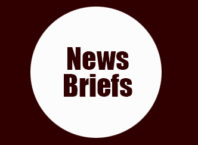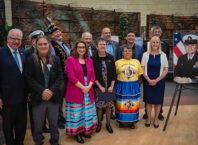 For the first time in the history of
For the first time in the history of
the city, Mayor Betsy Hodges selected the Minneapolis American Indian
Center as the site of her State of the City address on April 24. Drum
group Ringing Shield performed at the opening of the speech. Daniel
Yang, Director of Organizing and Community Building at the Native
American Community Development Institute, and Bill Means, co-founder
of the International Indian Treaty Council, introduced the mayor.
Yang commended Hodges for continuing
to engage the Native community in discussions about citywide issues.
“The hard truth is, more often than not, like in so many
communities of color, we don’t see those who ask for our votes again
until four to six years later when the next election rolls around,”
he said.
Yang also spoke on the importance of
the Minneapolis city council’s vote on the Indigenous People’s Day
Resolution, which would be recognized in place of Columbus Day. “If
it’s important for the City of Minneapolis to have all of its
residents feel respected, dignified, and valued, this is an important
step in healing the pain that is associated with this day and the
Indigenous people that call this place home,” he said.
Means talked about historical aspects
of Indigenous people’s relationships with the city of Minneapolis
while looking forward to the future of their interactions. “This is
an historic day because it is recognition of the contributions of
Indian people to this great city, starting with the basic ingredient
– the land,” he said. “Today begins a continuation of the
reconciliation with Indian people, the recognition of the
contributions of Indian people and the recognition of our rights and
our responsibilities to our communities.”
Many other leaders in the Native
community feel that the State of the City address marks an important
step in bringing Indigenous issues into discussions about citywide
policies. Bill Ziegler, Chief
Executive Officer of Little Earth of United Tribes, said that the
speech shows solidarity between the issues faced in the Native
community and Minneapolis as a whole.
“I
think the significance of this event happening here at the Indian
Center on Franklin Avenue is a way for the mayor’s office to say and
show the American Indian community that our issues are also issues
that face the rest of the city and that we’re going to be given the
respect to have our voices at the table and be taken seriously,” he
said. “I’m hopeful through Mayor Hodges’ leadership that this isn’t
just a show, that as she goes throughout her term our issues will
remain at the forefront of the work that she does."
Christine
McDonald, the American Indian Community Specialist with the City of
Minneapolis, said the move represents the city’s acknowledgment of
the issues members of the Native American community face.
“Being an
employee of the City of Minneapolis, I constantly felt that I was an
interrupter. Whenever we speak about information and data about our
city, about our population, a lot of times it didn’t reflect our
community. And the response I would get is that our numbers weren’t
big enough for the data to show up and I would push back and say that
that doesn’t mean that we’re not relevant,” she said. “It’s about
representation, it’s about acknowledgment, it’s definitely about
equity. So many people have a romanticized version of Native
Americans and they forget that we’re still here. They don’t realize
that when it comes to all of the gaps, we have the biggest gaps.”
Mike
Goze, the Chief Executive Officer of the American Indian Community
Development Corporation, feels that the mayor’s speech showed that
the city government recognizes the American Indian community as
important players in the city’s overall success.
“It
goes along with them bringing all the candidates to the community
through the process and solidifies their understanding that the
American Indian community is strong and well and needs to be
recognized,” Goze said.
Ashley
Fairbanks,Ward 9 Policy Aide, thinks that Hodges showed recognition
for the Native community and its issues that few mayors have
exhibited. “It’s so important to immediately reengage and she’s
here to talk to our community,” she said. “Just being here is
acknowledging the existence of our community and the cultural
corridor, which is more than most mayors have done in the past. “
Wakinyan
LaPointe, a member of Ringing Shield, said that Hodges’ mention of
renaming Columbus Day Indigenous People’s Day resonated with him
especially.
“The history of
Native peoples needs to be recognized in order to establish a
relationship with the community and to recognize urban Natives here,”
he said. “It’s an effort that should be implemented in other states
as well in order to effectively address the needs of Native youth in
education systems, but also to give the youth a place in the
community to learn more about who they are within these institutions.
There’s a deep need for it and it fits the aspirations of Native
communities.”
 Thorne LaPointe,
Thorne LaPointe,
also of Ringing Shield, identified with the mayor’s asset-based
approach. “She really pointed out the leaders and the shakers and
movers in the community who are thinking ahead for a sustainable
future at all sectors and all levels. It helps us think anew; about
our current situations, our current circumstances and how we can make
it better,” he said. “I really see her shifting the focus from
the problems to our strengths and our number one assets. I really
liked her approach in finding common ground and speaking in terms of
that.”
Hodges’ speech focused on themes of
equity and economic growth.
“Growth that includes us all will
propel us further than doing what we’ve always done. Because doing
what we’ve always done will get us what we’ve always gotten. And what
we’ve always gotten is growth that is thwarted by the biggest
disparities in the country between white people and people of color,”
she said. “While we are a great city, we are not a great city for
everyone, and that truth limits how far we can go. In the next three
decades, it will actively erode the gains we have made that we are so
rightfully proud of.”
Hodges noted a study released by the
International Monetary Fund that shows that countries who reduce
inequalities among their populations by 10 percent experience an
economic growth of 50 percent. She noted that important aspects of
this equity include education, access to public transit, job growth
and support for small business owners from all backgrounds.
“The key to our future rests on
making sure that everyone has what they need to take advantage of all
we have to offer. Our common future rests on it,” Hodges said. “We
are one Minneapolis, my friends. Acting like it will get us
everywhere we choose to go.”
PHOTOS BY JAIDA GRAY EAGLE | THE CIRCLE
Top: Mayor Betsy Hodges delivers her first State of the City Address at the Minneapolis American Indian Center, a first for the American Indian Cultural Corridor.
Middle: Bill Means, International Indian Treaty Council co-founder, introduces Hodges on April 24.
Bottom: Drum group Ringing Shield offered several songs as guests and dignitaries gathered to hear Hodges speak.






